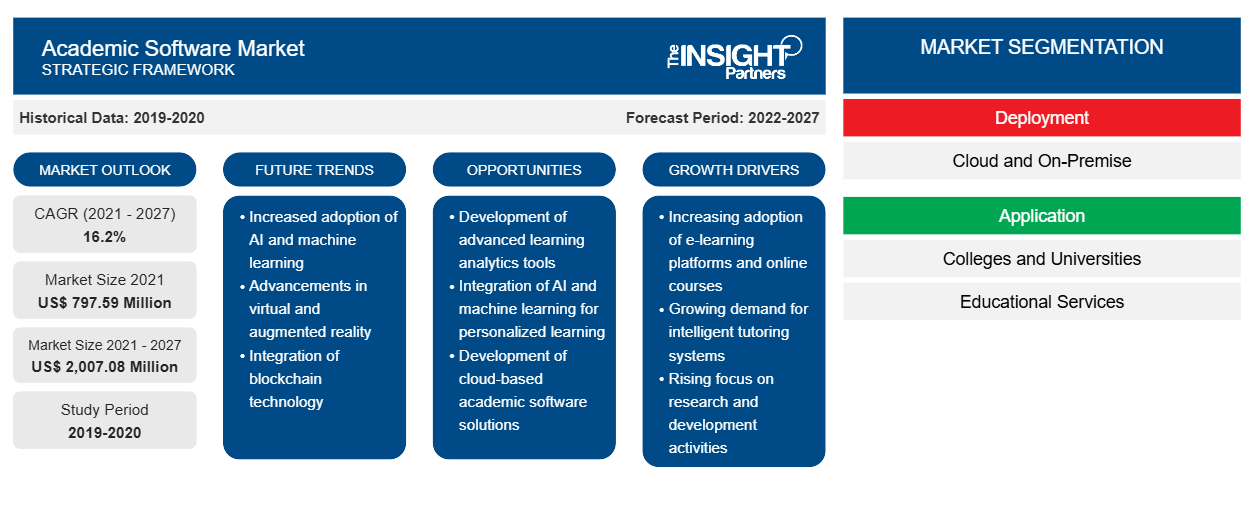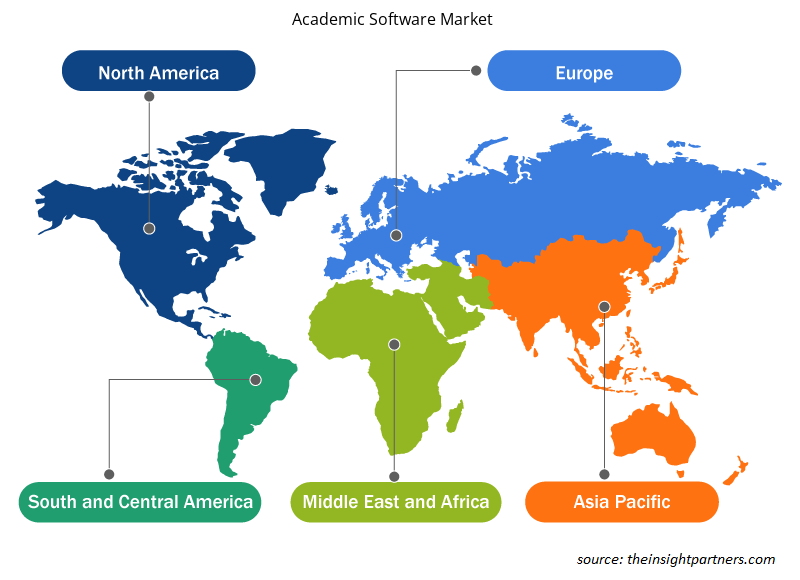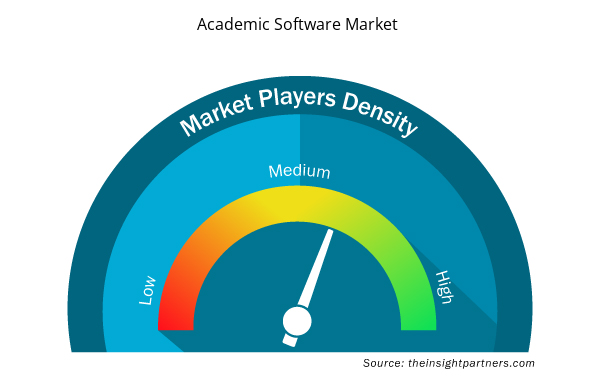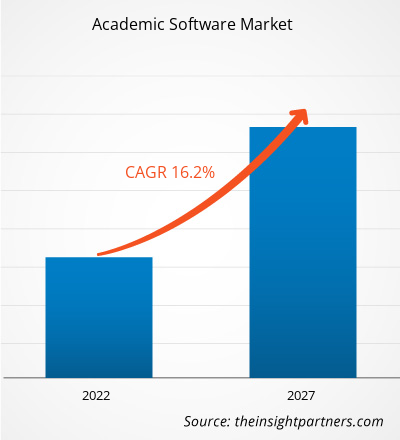The academic software market is expected to grow from US$ 797.59 million in 2021 to US$ 2,007.08 million by 2027. The Academic software market is expected to grow at a CAGR of 16.2% during the forecast period of 2021 to 2027.
Increasing adoption of eLearning across institutions is the key factor driving the growth of the academic software market. In eLearning, by reading or watching content, it is changing the way education is delivered. Several eLearning courses such as animation, podcasts, and videos create a multi-modal and realistic learning environment. ELearning, educational content opens up several immersive learning opportunities for learners through computers, laptops, tablets, or smartphones. Instead of being in a passive environment, students can choose what they need to learn easily and quickly. These benefits are increasing the demand for academic software across the world.
The COVID-19 pandemic has severely affected the education sector worldwide. This has also promoted the adoption of online education system across all major economies across the world; thereby, influencing the adoption of software for various applications, such as delivering lectures, manage students, and other operational activities from remote locations. Thus, the rising adoption of technologically advanced solutions across the sector is expected to positively impact the growth of the academic software market during the pandemic.
Based on deployment, the academic software market is segmented into cloud and on-premise. In 2019, the cloud segment accounted for a higher share in the market. In recent years, the technology industry has steadily seen a major increase in adoption of cloud-based computing. This is due to the fact that cloud-based computing simplifies the time of implementation and reduces deployment costs substantially. This advantage has attracted a large number of end users; thus, the majority of academic software market players deliver cloud-based products in conjunction with the growing demand for cloud-based software. In addition, the internet infrastructure in developed countries has evolved and is flourishing in many developing countries, enabling end users to access the cloud based solutions in both developed and developing countries
Customize This Report To Suit Your Requirement
You will get customization on any report - free of charge - including parts of this report, or country-level analysis, Excel Data pack, as well as avail great offers and discounts for start-ups & universities
Academic Software Market: Strategic Insights

- Get Top Key Market Trends of this report.This FREE sample will include data analysis, ranging from market trends to estimates and forecasts.
Customize This Report To Suit Your Requirement
You will get customization on any report - free of charge - including parts of this report, or country-level analysis, Excel Data pack, as well as avail great offers and discounts for start-ups & universities
Academic Software Market: Strategic Insights

- Get Top Key Market Trends of this report.This FREE sample will include data analysis, ranging from market trends to estimates and forecasts.
Academic Software Market Insights
Integration of Technologies such as Artificial Intelligence with Academic Software Solutions
Artificial intelligence (AI) is a technology that gives computers the ability, in the same way as humans, to communicate with people, understand events, and learn and react to events. Over the years, artificial intelligence not only had huge applications across industries—such as security and surveillance and information technology—but it had also experienced a rise in adoption of the technologies in the education sector. AI is being adopted across schools, colleges, and universities for automating repetitive tasks, such as grading, financial analysis, and admission processes. For example, AI can be calibrated to learn and model teacher actions while grading, through advanced computer programs—such as Automated Grading—for automatic grade assignment in the future. Over time, the program would learn the academic skills of multiple students and, based on their performances, prepare customized training plans.
Deployment -Based Market Insights
Based on deployment type, the global academic software market is segmented into cloud and on-premise. The cloud-based academic software is witnessing high demand compared to on-premises academic software. The cloud segment generates the majority of the demand since it is comparatively less expensive due to strong network infrastructure in developed countries. In addition, the cloud-based academic software vendors are highly focused on developing a high-level security patch in order to eliminate the risk of cyberattacks. This factor is also creating significant demand from the end users, thereby driving the academic software market.
Application -Based Market Insights
Based on application, the academic software market is segmented into colleges and universities, educational services, and others. Increasing adoption of modern solutions across educational institutions and universities to offer both online and offline courses to students coupled with the initiative to make advanced solutions available to all staff and students is influencing the adoption of academic software. This is fuelling the growth of the market over the years.
Players operating in the Academic software market focus on strategies, such as market initiatives, acquisitions, and product launches, to maintain their positions in the academic software market. A few developments by key players of the academic software market are:
In December 2020, Alma student information system platform introduced grade point averages (GPA) feature which is been added to the grade book tool. The standards-based grading (SBG) is rooted in aligning student feedback and progress measurement against the particular skills being taught and assessed, rather than using a single score to cover multiple topics or standards.
In July 2020, ConexED had updated its iOS App 2.2.3 for a more user-friendly experience. This app enables students, staff, and faculty to join virtual meetings and video conferences on their mobile devices.
Academic Software Market Regional Insights
The regional trends and factors influencing the Academic Software Market throughout the forecast period have been thoroughly explained by the analysts at Insight Partners. This section also discusses Academic Software Market segments and geography across North America, Europe, Asia Pacific, Middle East and Africa, and South and Central America.

- Get the Regional Specific Data for Academic Software Market
Academic Software Market Report Scope
| Report Attribute | Details |
|---|---|
| Market size in 2021 | US$ 797.59 Million |
| Market Size by 2027 | US$ 2,007.08 Million |
| Global CAGR (2021 - 2027) | 16.2% |
| Historical Data | 2019-2020 |
| Forecast period | 2022-2027 |
| Segments Covered |
By Deployment
|
| Regions and Countries Covered | North America
|
| Market leaders and key company profiles |
Academic Software Market Players Density: Understanding Its Impact on Business Dynamics
The Academic Software Market market is growing rapidly, driven by increasing end-user demand due to factors such as evolving consumer preferences, technological advancements, and greater awareness of the product's benefits. As demand rises, businesses are expanding their offerings, innovating to meet consumer needs, and capitalizing on emerging trends, which further fuels market growth.
Market players density refers to the distribution of firms or companies operating within a particular market or industry. It indicates how many competitors (market players) are present in a given market space relative to its size or total market value.
Major Companies operating in the Academic Software Market are:
- Alma
- CAMPUS CAFÉ SOFTWARE
- ConexED
- Envisio Solutions Inc.
- FULL FABRIC
Disclaimer: The companies listed above are not ranked in any particular order.

- Get the Academic Software Market top key players overview
Academic software Market – by Deployment
- Cloud
- On-Premise
Academic software Market – by Application
- Colleges and Universities
- Educational Services
- Others
Academic software Market – by Geography
North America
- US
- Canada
- Mexico
Europe
- France
- Germany
- Russia
- UK
- Italy
- Rest of Europe
Asia Pacific (APAC)
- China
- India
- Japan
- Australia
- South Korea
- Rest of APAC
MEA
- Saudi Arabia
- UAE
- South Africa
- Rest of MEA
SAM
- Brazil
- Argentina
- Rest of SAM
Academic software Market – Company Profiles
- Alma
- CAMPUS CAFÉ SOFTWARE
- ConexED
- Envisio Solutions Inc.
- FULL FABRIC
- PowerVista Software, Inc.
- Qualtrics LLC
- Tophatmonocle Corp
- TrueDialog
- WizeHive
- Historical Analysis (2 Years), Base Year, Forecast (7 Years) with CAGR
- PEST and SWOT Analysis
- Market Size Value / Volume - Global, Regional, Country
- Industry and Competitive Landscape
- Excel Dataset


- Mobile Phone Insurance Market
- Pharmacovigilance and Drug Safety Software Market
- Europe Surety Market
- Helicopters Market
- Constipation Treatment Market
- Military Rubber Tracks Market
- Small Internal Combustion Engine Market
- Virtual Event Software Market
- Human Microbiome Market
- Authentication and Brand Protection Market

Report Coverage
Revenue forecast, Company Analysis, Industry landscape, Growth factors, and Trends

Segment Covered
Deployment and Application

Regional Scope
North America, Europe, Asia Pacific, Middle East & Africa, South & Central America

Country Scope
Argentina, Australia, Brazil, Canada, China, France, Germany, India, Italy, Japan, Mexico, Russian Federation, Saudi Arabia, South Africa, South Korea, United Arab Emirates, United Kingdom, United States
Frequently Asked Questions
Increase in adoption of modern technologies and rapid shift from traditional teaching methodologies to modern teaching techniques are influencing the adoption of academic software solutions across colleges and universities across the globe. Additionally, software packages taken by universities and colleges for a large number of users are also cost efficient for both the institutions and the students. In the private sector, for instance, many software packages that a student wants are very expensive. This is why VIVES University of Applied Sciences has developed a partnership to deliver academic solutions with Signpost. Bulk transaction or software license transactions would substantially lower the cost of all their students' required application. A standard software package is compiled by VIVES on Signpost's Academic Software platform, which consists of hundreds of software titles that must be purchased by any VIVES student as a compulsory learning material, regardless of the education or training process. The same can be installed and used on personal laptops and desktops of students. Thus, increasing initiatives by colleges and universities to install bulk academic solutions for students are contributing to the academic software market growth across the globe.
The software industry is growing at a fast pace in the region as it attracts various technological developments. The US federal government spends ~US$ 79 billion every year on the development of primary and secondary education programs. In addition, the trend of privatizing schools in the US is prevailing which is another aspect that would help in boosting the scope of integrating advanced software in schools. In the 21st century, the education sector is experiencing numerous efforts to privatize educational services which were provided by public agencies & school systems. Privatization is expected to transform the method of running schools and will open up opportunities for integrating new software and technologies to manage operations in educational institutes efficiently.
Artificial intelligence (AI) is a technology that gives computers the ability, in the same way as humans, to communicate with people, understand events, and learn and react to events. Over the years, artificial intelligence not only had huge applications across industries—such as security and surveillance and information technology—but it had also experienced a rise in adoption of the technologies in the education sector. AI is being adopted across schools, colleges, and universities for automating repetitive tasks, such as grading, financial analysis, and admission processes. For example, AI can be calibrated to learn and model teacher actions while grading, through advanced computer programs—such as Automated Grading—for automatic grade assignment in the future. Over time, the program would learn the academic skills of multiple students and, based on their performances, prepare customized training plans.
Trends and growth analysis reports related to Technology, Media and Telecommunications : READ MORE..
The List of Companies - Academic Software Market
- Alma
- CAMPUS CAFÉ SOFTWARE
- ConexED
- Envisio Solutions Inc.
- FULL FABRIC
- PowerVista Software, Inc.
- Qualtrics LLC
- Tophatmonocle Corp
- TrueDialog
- WizeHive

 Get Free Sample For
Get Free Sample For